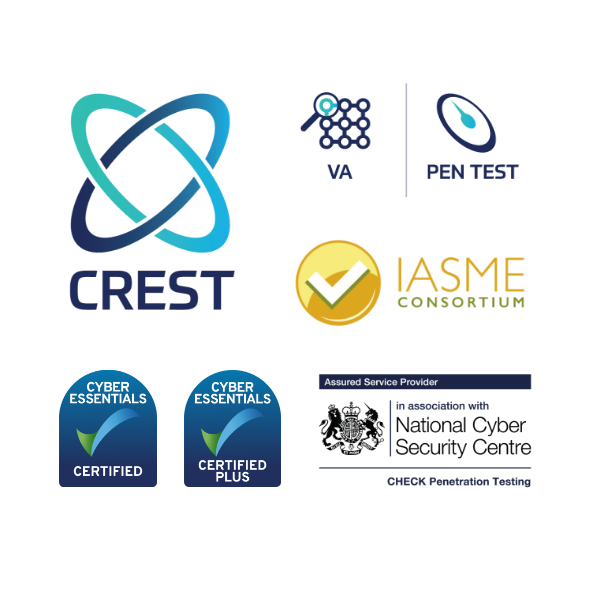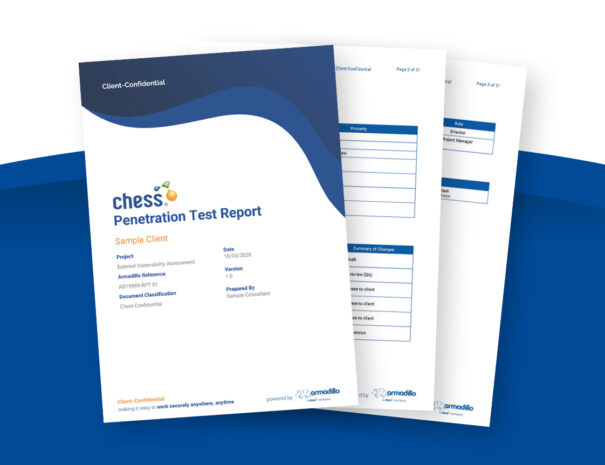Penetration Testing Services | Cyber Security Services
Detect.
CREST Accredited Penetration Testing
Penetration Testing is a way to identify vulnerabilities before attackers do, evaluate how effectively you can respond to security threats, assess your compliance with security policies, and improve the level of security awareness amongst your staff.
Using industry-standard methodologies, our team of CREST, CHECK, and Cyber Scheme approved engineers undertake ethical attack simulations to uncover areas of concern in your infrastructure, policies, and procedures.
Our tailored assessments can cover every aspect of security from general vulnerability identification to fully exploiting vulnerable web applications.

Types of Penetration Testing
Our team of experts have extensive experience in penetration testing a range of systems and applications.
These can be built into your testing plan at the scoping stage.
Red Teaming
An advanced type of goal-oriented Penetration Testing that simulates a real-world attack to access sensitive data or systems.
Red Teaming >
Vulnerability Assessments
Automated internal and external network and device vulnerability assessments for a high-level view of potential risks.
Vulnerability Assessments >
IT Health Check
CHECK approved IT Health Check (ITHC) is a Penetration Test audited by the National Cyber Security Centre (NCSC).
Internal Infrastructure Penetration Testing
Penetration Testing to identify and exploit vulnerabilities within your internal network.
External Infrastructure Penetration Testing
Replicating a real-life attack to identify issues with network services, hosts, devices, web, mail, and FTP servers.
Website & Application Security Testing
Testing any application type, language, or environment, following the OWASP methodology for vulnerabilities and weaknesses.
Social Engineering
Often the easiest way to breach a company or network is not by hacking a website, it is by tricking employees to gain access to systems or a building.
Build Reviews
A Build Review assesses the configuration of the operating system, device configuration and its settings against industry benchmarks.
Is Penetration Testing Right for My Organisation?
Using a third party to assess your systems allows them to ‘think like an attacker’ and bring a fresh perspective to your cyber security. Penetration Testing can pinpoint weak points in your defences and highlight areas that can be improved using your existing security technology.
Incorporating regular Penetration Tests into your planning helps you to stay on top of your security posture, preserve your brand, and maintain regulatory compliance to standards and regulations including GDPR, PCI DSS, and ISO 27001.
Penetration Tests vs Vulnerability Assessments
Vulnerability Assessments are used to identify system and software vulnerabilities and provide a high-level overview of overall security posture. They are an effective way for companies who do not have visibility of their security posture to gain a more complete understanding. For organisations with legacy infrastructure, it is a quick and cost-effective way to identify and focus on software and systems that can be fixed easily.
A Penetration Test not only identifies security issues within the company’s infrastructure, systems, and operations, but also exploits these vulnerabilities and, if necessarily, combines them to achieve a specific objective. For example, if the tester’s objective is to gain internal network access, they would find a vulnerability that allows them to upload files, then another one that lets them find those files, and another one that marries these up to execute something malicious.
It’s not the testing process that matters the most – it’s implementing the remediation actions from the reports to proactively improve your security posture.
Our team of experts can help you demystify a Penetration Test report and incorporate the fixes.
Penetration Testing: The CyberLab Approach
The way we structure our Penetration Tests aligns closely with the steps taken by bad actors to target and compromise your systems. We replicate the approach of real-world adversaries to simulate and evaluate how your systems and processes respond to a cyber attack.
One of our CREST, CHECK, and Cyber Scheme certified consultants will work with you to define the scope of the engagement and ensure that our tests will fulfil your requirements.
Your assigned consultant will gather information on your organisation, including:
- IP addresses of websites and MX records
- Details of e-mail addresses
- Social networks
- People search
- Job search websites
This information will assist in identifying and exploiting any vulnerabilities or weaknesses.
Within the Threat Analysis stage we will identify a range of potential vulnerabilities within your target systems, which will typically involve a specialist engineer examining:
- Attack avenues, vectors, and threat agents
- Results from Research, Reconnaissance and Enumeration
- Technical system/network/application vulnerabilities
We will leverage automated tools and manual testing techniques at this stage.
Once we have identified vulnerabilities, we will attempt to exploit them in order to gain entry to the targeted system.
There are three phases to this stage:
Exploit – use vulnerabilities to gain access to a system, e.g. inject commands into an application that provide control over the target.
Escalate – attempt to use the exploited control over the target to increase access or escalate privileges to obtain further rights to the system, such as admin privileges.
Advance – attempt to move from the target system across the infrastructure to find other vulnerable systems (lateral movement) potentially using escalated privileges from target systems and attempting to gain further escalated privileges and access to the network.
Your Penetration Test Report will detail any identified threats or vulnerabilities, as well as our recommended remedial actions. Threats and vulnerabilities will be ranked in order of importance.
The report will also contain an executive summary and attack narrative which will explain the technical risks in business terms. Where required, we can arrange for your CyberLab engineer to present the report to the key stakeholders within your organisation.
The report will provide information on remedial actions required to reduce the threats and vulnerabilities that have been identified.
At this stage, we can provide you with the additional consultancy, products, and services to further improve your security posture.
CREST, CHECK & Cyber Scheme Certified
CREST (the Council of Registered Ethical Security Testers) is an international accreditation with a strict Codes of Conduct and Ethics. CHECK is the Government-backed accreditation from the National Cyber Security Centre (NCSC) which certifies that a company can conduct authorised penetration tests of public sector systems and networks.
All our penetration testers are certified by CREST, with senior consultants certified by CREST to the highest CCT Level. Our testers are also either CHECK Team Leaders (CTL’s) or Team Members (CTM’s).
Security testers that pass the Cyber Scheme exams demonstrate ‘competence and skill at the highest levels’ as defined by the National Technical Authority for Cyber Security (NCSC).
Our team have decades of combined experience and take pride in operating at the highest level of the industry – conducting a broad range of government and commercial tests – and always aim to go the extra mile.

Speak With an Expert
Enter your details and one of our specialists will be in touch.
Whether you’re looking to implement basic cyber security best practice, improve your existing defences, or introduce a new system or solution, our team of expert consultants, engineers, and ethical hackers are here to help.
Our team specialise in creating bespoke security solutions and testing packages to improve and maintain your security posture.
We are 100% vendor agnostic and will only ever recommend the best products and solutions for your requirements.



